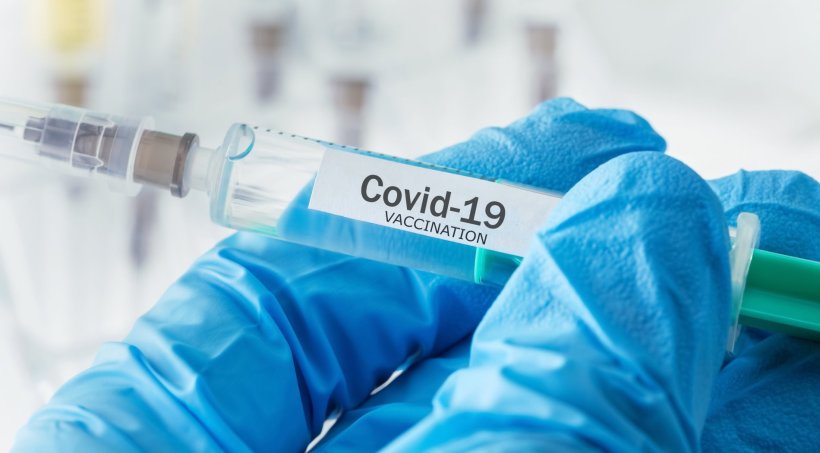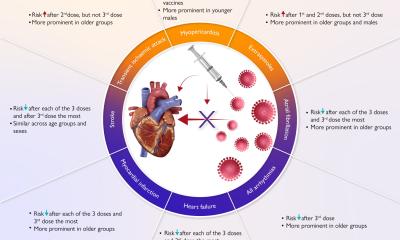
Image source: Adobe Stock/Tobias Arhelger
News • Coronavirus countermeasures
Long Covid: referral drop suggests vaccine effectiveness
Referrals to Cambridge’s long Covid clinic fell dramatically in the period August 2021 to June 2022, which researchers say is likely due to the successful rollout of the vaccine.
According to the Office of National Statistics, in July this year an estimated 2 million people in the UK were living with self-reported long Covid – that is, symptoms continuing for more than four weeks after their first suspected coronavirus (Covid-19) infection. Patients report symptoms including fatigue, muscle aches, memory problems and shortness of breath more than six months post-acute Covid-19, and a significant number of patients have not fully recovered two years since the initial infection.
Two recent studies have suggested that vaccination strongly reduced long Covid symptoms one-to-three months after infection, but another study using a cohort of US Army Veterans suggested a more modest, 15% reduction at six months.
Evidence from our clinic suggests that [the vaccine] has also played an important role in reducing the rates of the most severe long Covid cases
Ben Krishna
In May 2020, Addenbrooke’s Hospital, part of Cambridge University Hospitals NHS Foundation Trust (CUH), set up a long Covid clinic, with patients referred to the clinic based on a number of criteria, one of which is symptoms duration of at least five months. These patients tend to be those on the severe end of the symptom spectrum, having been referred following assessment by a team that includes a GP, mental health practitioners, physio and occupational therapists amongst other specialists.
Researchers at the Cambridge Institute of Therapeutic Immunology & Infectious Disease (CITIID) at the University of Cambridge and CUH, analysed data from the clinic and found a 79% drop in the number of patients being referred to the clinic from August 2021 to June 2022, compared to August 2020 to July 2021. The decrease began five months after people started receiving second doses of Covid-19 vaccines. Six-month moving averages fell from around 10 referrals per month to just one or two referrals per month. This effect has so far been sustained until at least June 2022, despite four times more cases per month of acute Covid-19 in England across the same time periods.
Dr Ben Krishna from the University of Cambridge said: “Long Covid can have a significant impact on an individual’s life, and the large number of patients still experiencing symptoms many months after infection is placing additional strain on our healthcare services. We know that rollout of the vaccines has had a major impact on the number and severity of Covid infections, and evidence from our clinic suggests that it has also played an important role in reducing the rates of the most severe long Covid cases.”
The researchers say that it is possible – but unlikely – that the emergence of the Delta variant may also have affected long Covid rates. However, the observed reduction in long Covid rates in August 2021 was from patients experiencing symptoms for five months, which they say would suggest a change beginning in March 2021. This correlates well with the second doses of vaccination in the UK, but the Delta wave did not begin until April 2021. The team say they also cannot rule out prior infections providing immunity that protects against long Covid from reinfections; however, primary infections were more common than reinfections around March-April 2021. The team observed no changes in symptoms between those referred for long Covid before or after vaccination for any of the major symptoms such as fatigue (73% pre-vaccination vs 76% post vaccination) and shortness of breath (18% pre-vaccination vs 23% post-vaccination).
It is not yet clear what level of immunity is required to protect against long Covid, say the researchers. As immunity wanes over time, booster shots – including variant-specific booster shots – may be necessary to minimise long Covid risk.
Dr Nyaradzai Sithole from CUH said: “As the virus continues to circulate and infect – and in many cases, re-infect – people, it’s important that everyone is up-to-date with their vaccinations. This will not only help prevent, or at least lessen, their primary Covid infection, but should reduce their risk of long Covid . But whether with the emergence of new variants we will begin to see an uptick in the number of cases of long Covid remains to be seen.”
The study is published in Clinical Infectious Diseases.
Source: © University of Cambridge (CC BY 4.0)
10.10.2022








